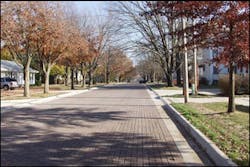Greening the Streets With Permeable Interlocking Concrete Pavers
At Forester University, our live webinars present you with the stormwater management experts, who share best management practices, informative project case studies, and real-world applications. Join our faculty of industry experts in our live webinar (or series of webinars) exploring the technological innovations, project site applications, and any associated regulatory requirements in a comprehensive discussion of this topic. Please see below for a full description and registration information for this event.
Greening the Streets with Permeable Interlocking Concrete Pavers
April 23, 2015; 11:00 am – 12:30 pm
There may be no stopping urban sprawl, but with the right tools, we can slow its environmental impact. Whether renovating old infrastructure or building new, permeable pavement is becoming a key low impact development (LID) component offering municipalities the ability to better manage their stormwater runoff AND meet EPA clean water requirements…without breaking the bank.
Are you employing PICP systems at your sites? And if not…should you be?
Join Chuck Taylor and Ricardo Aguirre for our FREE webinar exploring permeable interlocking concrete pavement (PICP) systems (e.g., components, applications, benefits, etc.) and how you can successfully design, implement, and maintain your PICP systems at your sites to improve your stormwater management, meet your EPA water quality requirements, and promote water reuse…cost-effectively.
In this webinar, we’ll discuss the different components of permeable interlocking concrete pavement (PICP), their functions, and how each contributes to the mitigation of peak flow rates, removal of first-flush contaminants, storage capacity, and water reuse. Within this discussion, Taylor and Aguirre will review third-party research (from NCSU, FGSU, etc.) revealing how permeable pavement improves stormwater runoff control, TSS removal, and water quality. We’ll then cover PICP design, implementation, and maintenance best practices from real-world case-studies and examples where PICP systems within a stormwater treatment train not only met regulations, but did so cost-effectively.
Taylor and Aguirre will present several real-world case studies of PICP projects (e.g., urban streets, subdivisions, parking lots, etc.) which secured municipal and regulatory approval, and led to successful partnerships and solutions for cities, institutions, commercial, and industrial applications. Within this discussion we’ll take a look at how permeable pavers are a key component in a sustainable stormwater treatment train approach designed to capture, treat, store, and promote groundwater recharge. Finally, we’ll dive into the many environmental and life quality benefits of permeable interlocking concrete pavement (PICP) including thermal pollution reduction, LEED contributions, evapotranspiration, air quality, water reuse, and energy savings.
Presenters:
Chuck R. Taylor – National Commercial Hardscapes Advisor, Oldcastle Architectural-Belgard Commercial Hardscapes;
Ricardo Aguirre, PE, CFM, WHC – National Hardscape Engineer Oldcastle APG
Credits: 1 PDH / 0.1 CEUs
Free



